- Home
- David Lubar
Strikeout of the Bleacher Weenies Page 6
Strikeout of the Bleacher Weenies Read online
Page 6
Bruce’s hand shot up. As he raised it, he realized the magician was already pointing at him.
“How about you, young man?” he asked.
It’s about time. Bruce left his seat and walked up the side steps to the stage. “I know all the tricks,” he said to the magician when he reached him.
“How nice,” the magician said. He flashed Bruce a big smile with teeth that, up close, revealed the dinginess of coffee stains. “There aren’t many people who are so fortunate. Wait right here.”
The magician dashed to the side of the stage. A moment later, he wheeled out a big box, painted in shiny black paint and decorated with large red exclamation points and yellow question marks. From close up, Bruce could see the markings had been badly painted by hand. The magician pulled a tape measure from his pants pocket and checked Bruce’s height. “Perfect,” he said.
The audience laughed. Bruce didn’t think it was much of a joke.
The magician flipped open the lid of the box. “Climb in,” he said.
Bruce climbed into the box and lay down. There was a semicircular cutout at one end that his neck fit into, and a pair of smaller cutouts at the other end for his ankles. His head and feet stuck out.
The magician closed the lid and picked up a saw.
Bruce turned his head toward the audience and smiled. He wondered whether he should tell them how the trick worked right now, or wait until after it was done. It might be even more fun to reveal the secret right in the middle of the action.
“I know how it’s done,” he said, just loud enough so the magician could hear him.
“I don’t,” the magician said. He started to saw into the top of the box.
The magician’s words echoed in Bruce’s mind, slowly taking on their full meaning.
I don’t.
Bruce knew exactly how the trick should be done. He also knew the magician hadn’t done the secret thing to the box that would make it only seem like Bruce had been cut in half.
“Fifty-three years,” the magician said, his voice hushed so only Bruce heard. “I’ve been performing magic onstage most of my life. Every show, there’s a little monster like you who tries to ruin things. Well, this final trick isn’t going to mystify anyone, but it will sure amaze them.”
“No!” Bruce screamed. He tried to pull himself free, but the lid was locked right down over his neck and ankles. He could twist and thrash, but he couldn’t escape.
The magician paused in his sawing and scanned the audience. “Anybody want to guess how it’s done?”
Not a hand went up. He resumed sawing.
“Stop!” Bruce screamed again and again as he heard the saw moving through the wood at the top of the box. He couldn’t see the blade. The box blocked his view. But he could imagine it moving closer and closer to his body.
The audience screamed in mock horror.
Bruce’s own screams turned into wordless wails as he felt the blade reach his stomach.
His eyes fell on Connor, who shouted, “I want to enjoy the last trick. Don’t ruin it for me.”
Bruce didn’t.
enDANGERed
“Not the candlesticks,” Mom said as Dad reached toward the mantle above the fireplace.
“We need a lot of silver,” he said.
“Then take your chess set,” she said.
“That’s a collector’s item,” he said.
“And the candlesticks are a family heirloom,” Mom said. She pointed to me. “We’ll be passing them along to Serena someday.”
“Nobody will be passing anything to anyone if we don’t stop that creature.” Dad lifted one of the candlesticks from the mantle and hefted it, as if trying to gauge how much it weighed.
“Chess set,” Mom said.
I could tell from the way his shoulders slumped that Dad knew he’d lost. He put the candlestick back on the mantle, went to the small table next to his favorite chair, and gathered the ninety-seven pieces of his solid-silver commemorative Civil War chess, checkers, and backgammon set.
“Can I come?” I asked. I had no idea what was going on, or where he was going, but I had a feeling Mom would put me to work if I stayed home.
“Sure,” Dad said.
I followed him out the door. We drove into town and parked outside Mr. Wenler’s Fish and Game Shop. I was always disappointed that “game shop” didn’t mean he sold Clue, or BINGO, or something like that. There were some angry birds on the wall, but they’d been stuffed and mounted, so that didn’t count. On top of which, “fish” didn’t mean tanks of guppies and Mollies, like in the pet shop.
Instead of using the front door, we went around back and down some steps to the basement. The place was crowded. I saw a whole lot of people I knew, including most of the local ranchers. I noticed that each person was carrying something made of silver. One by one, they’d hand what they had to Mr. Wenler, who’d study it for a moment and then toss it into a large metal pot.
When Dad handed him the bag holding the game pieces, he pulled one out, glanced at it, tapped it with a fingernail, then said, “That’s junk. It’s not silver.”
“No way,” Dad said. “I have a signed-and-numbered certificate of authenticity.”
“That certificate’s junk, too,” Mr. Wenler said. “Probably not even a real signature. If you bought it for the silver, you’ve been bamboozled.”
Dad looked like he’d heard good news and bad news all at once. His game set wasn’t real silver, but it also wasn’t getting tossed in that pot. I guess there are worse things in life than getting bamboozled.
Dad turned to me. “I’ll drive us home. You have to tell Mom you need the candlesticks.”
“No way,” I said.
Luckily, Mr. Wenler stopped us. “We have enough,” he told Dad.
I still had no real idea what was going on. Mr. Wenler lit a huge propane flame under the pot. The air in the room got a lot hotter, and the silver in the pot started to melt. It reminded me of when Mom tosses a hunk of butter in the frying pan. A while later, I watched, along with everyone else, as Mr. Wenler poured a ladleful of melted silver into a mold. Soon after that, he opened the mold, revealing the bullets. And that’s when I figured out what was going on.
“Silver bullets?” I said.
“It’s nothing to worry about,” Dad said.
But, the next night, as the full moon rose, Dad and a dozen other men and women met up right down the road from our house, got their assigned areas, and stalked the woods, armed with silver bullets and silver knives.
Two of the hunters even had bows with silver-tipped arrows. One used a recurve bow, the other a crossbow. I think they’d been reading a lot of novels recently in which people ran around with bows and arrows.
They hunted the werewolf, but they didn’t find him. Only three shots got fired—two in panic at startling sounds, and one by accident. And only one leg got slightly grazed.
For twenty-seven days after that, all was calm. But on the night of the next full moon, the hunters went hunting again. There were even more of them now, and they met in town this time. Mom and I went to the town square together, to watch the hunters head off.
They didn’t manage to kill the werewolf this time, either. But they spotted him in the woods—a wolf far larger than any natural wolf, and far faster than any animal known to man. Based on the brief sightings, he seemed as comfortable on two legs as four.
“Next month we’ll get him, for sure,” my dad said at breakfast.
“But why do you have to kill him?” I asked.
“He ate one of our sheep.”
“We eat our sheep all the time.” I pointed out the window toward our pastures. “We have dozens of sheep. He just took one.”
“He’ll kill a person, next,” Dad said. “Maybe a child.”
I stomped my foot. “You don’t know that. You eat sheep. You’ve never killed a person. I eat sheep. Do you want to shoot me?”
Dad gave me the glare that meant there would be no more discussion. I didn’t say
another word, but I thought about nothing else. The moon is full every twenty-eight days. I had twenty-seven days to find an answer that didn’t involve silver bullets and bloodshed. I knew my Dad. And I knew the others. They wouldn’t give up until they got what they wanted.
Neither would I.
In school, I spent my free time in the library. That’s a place of power, if you know how to use it. I stayed there after school every day, and didn’t leave until they locked the doors. I kept searching until I found what I needed. Dad might rule our house, but there were other forces out there more powerful than even the strictest parent or the sternest rancher.
I got in touch with the right people a week before the next hunt. I didn’t hear back from them, even though I’d given them my mailing address, e-mail address, and phone number. I was afraid they’d pay no attention to me. I was only a kid. I didn’t have any power. I didn’t have any special friends. I wasn’t important.
But the night of the next hunt, as the hunters plotted their strategy and talked about how they would kill the werewolf for sure this time, a large black car drove into the town square, where everyone had gathered. The driver’s door opened. A man in a dark suit got out. He was holding a sheet of paper.
“I need to speak to the mayor,” he said.
Mayor Bellamy walked over to him. “What’s this about?”
The man handed him a single sheet of paper. The mayor read it, let out a long sigh, and said, “Listen up, folks. The hunt is canceled. Everyone can go home.”
There were cries and shouts from the crowd. The mayor raised his hand for silence. But he let the stranger give the explanation.
“You have hereby been notified that Canis lyconthropus, also known as the North American werewolf, has just been placed on the endangered-species list. Thus, it is unlawful to hunt, pursue, or disturb any member of that species, or to destroy their habitat. There are severe penalties and possible prison terms for violating this order.” He got back in the car and drove off.
The hunters grumbled some more. Dad looked in my direction, as if waiting for an explanation or confession. I couldn’t think of anything to say. He shook his head, and then I could swear that he smiled. But just a little. I guess, if someone had to ruin the werewolf hunt, he was sort of proud that it was his little girl. At least, I’m going to tell myself that’s how he felt.
As I walked to our car with my parents, Mom put her hand on my shoulder. “I’m proud of you,” she said. “You’ve always been clever.”
“Thanks.” I was proud of myself, too.
Later that night, there was a tap at my window. A pale man, with long, pointed canine teeth that looked like fangs, stood outside. He was wearing a black cape, and he seemed to be floating.
I opened the window, but I didn’t invite him inside. I knew better than to do that. “Yes?” I asked.
“Are you the one who helped Talbot?” he asked.
“Talbot?” I didn’t recognize the name.
“The werewolf,” he said. “He was hiding near the town square, to keep an eye on the hunters, and he heard everything. Despite an excess of hair in his ears, he has excellent hearing. He told me how a bright young lady appears to have saved his hide.”
I nodded. “Yeah, that was me. I didn’t want him to get killed.”
“I’m feeling sort of endangered myself. People have started gathering garlic. I can hear the scraping of their knives as they sharpen stakes. Things are about to get very unpleasant for me now that their attention has been forced away from Talbot.”
“Don’t worry,” I said, thinking about some of the regulations I’d uncovered in my research. “I’m not sure whether to approach your condition as a disability or minority issue, but I’m sure you’re protected by at least one federal law, if not several. I’ll get in touch with the right people first thing in the morning.”
“Promise?” he asked.
“Cross my heart.”
“Thank you,” he said. “But could you hold off with the crosses until I leave?”
“No problem.”
The vampire drifted away. The troll from under the bridge by the creek came to my window next. And then the unicorn, followed by a pixie and a pair of elves. It was a long night. But I didn’t mind, because it was also an amazing one. I always expected I’d have an interesting future, but it looked like my life was going to be fantastic in more ways than one.
TWO TIMERS
We called them “time grenades.” They weren’t really like hand grenades in any way, except that they were round and they went off after you set them. But it was a cool name. Toby and I found them when we were cutting through Henshaw’s Woods.
Actually, we weren’t so much cutting as fleeing. Rooney Milgram had spotted us right after we’d left the corner store with a bag of Twizzlers. I didn’t mind sharing my candy, but Rooney didn’t share. Rooney took. And he didn’t take gently.
We kept going until we didn’t hear Rooney behind us anymore, and ended up deep in the woods.
“I think we lost him,” I said.
But Toby didn’t answer me. He was bent down, staring at something. There’d been a heavy rain the week before, and the creek had washed over the banks before the water went down.
“What’s that?” Toby said.
I looked where he was pointing, near the root ball of a fallen tree. I saw something shiny and angled. We both knelt on the damp earth. I reached out and touched the thing. It was pointy, but not sharp.
“A box, maybe?” I said.
We dug. It was a box. Or maybe it would be more accurate to call it a small chest. It was about a foot and a half wide, and a foot tall. There was writing on the top, but it didn’t look like any language I’d ever come across.
It took us five minutes to figure out the clasp. You had to push, twist, and squeeze it just the right way for it to swing open.
The time grenades were inside. Of course, when we first saw them, we had no idea what they were. They looked kind of like small Christmas ornaments, shiny and red, but with a knob at the top and no loop to hang them on anything. Toby took one and twisted the knob.
Glowing symbols showed up in green on the red surface of the ball. “Cool,” Toby said. He twisted the top a bit more. “I think there’s a pattern.”
“Show me,” I said, leaning over to watch.
He twisted the knob in one direction for three full turns. Then he twisted it in the other direction. At some point the numbers shifted from green to blue. Whenever he turned the knob right back to where I guess it had been when we found the things, the numbers went away. I could also hear a tiny click at that point.
“What does it mean?” I asked.
“I think it’s time settings,” he said, “like on an oven.” He held the grenade up and turned it a tiny bit at a time, stopping whenever the display changed. “See how the first digit goes through a cycle of twelve different symbols before getting back to the start, and then the next one changes?”
I watched. “Yeah. I get it. So it’s some sort of clock?”
“Maybe,” he said. “Or maybe it’s some kind of timer. Let’s find out.”
He turned the knob until the numbers vanished, then gave it a small twist to bring the first number back. “This should be pretty short. I wonder how you activate it?”
“That’s not a good idea,” I said. “You don’t know what it will do.”
He pushed down on the knob.
CLICK.
The numbers flashed.
“Cool,” Toby said.
Then he vanished.
THWAMPH.
I felt a breeze riffle my hair, as if air had been sucked into the place where he’d been.
“Toby!” I screamed.
I looked around, clueless about what to do. So I screamed his name again, which didn’t help solve things any more than it had the first time. I was afraid I’d never see him again.
If he’d fallen into a mine pit or a river, I’d know what to do. But I was c
lueless as to how I could help him now. I looked at the pile of spheres in the box. I could try to follow him, I thought. I’d do that for my friend. I’d go after him, for sure. But I was afraid if I used one of those things, I was a lot more likely to make the situation worse than better.
PHWAMTH.
Toby popped back, right in front of me, creating another blast of air that blew outward this time.
“Awesome,” he said.
“Are you okay?” I asked.
“Totally.” He grinned and tossed the time grenade up in the air like an apple, then caught it as it dropped. He twisted the stem, but nothing appeared. I guess it was good for only one use.
“Where’d you go?” I asked.
“The future, I think.” He frowned, then added, “Which is now the present.”
“Huh?” I was lost.
“I went ahead. Yeah, that has to be what happened. I leaped forward in time. Did I vanish?”
“Yeah. Poof. You disappeared.”
“For how long?” Toby asked.
“Just ten or fifteen seconds,” I said. “It wasn’t long.”
“But it happened instantly for me. You never vanished. But I guess you moved while I was away.” Toby pointed to the ground. “You’d been standing right there. But you must have run around when I jumped ahead.”
“Yeah,” I said. “I didn’t know what to do.”
“Hmmm. Fascinating.” He plopped down on the ground, crossed his legs, and rested his chin on one hand. “I have to think about this.”
After a period of time, during which he scrunched his face up in various ways and produced thoughtful sounds of various sorts, he looked at me and said, “Yeah. It makes sense. If I jumped, let’s say, ten seconds ahead in time, there’d be ten seconds during which I wasn’t here, from your point of view. You traveled those ten seconds the normal way, one second at a time. But I leaped over them. I jumped ahead of you in time and met you ten seconds in your future. Get it?”
“Yeah. I see that. It would be like if we were running around the track, and someone picked you up and dropped you ahead of me.” It was easier to think about time if I put it in terms of space.
“Good analogy,” Toby said. “Though I’m not sure how you caught up with me. We’ll figure it all out eventually.”

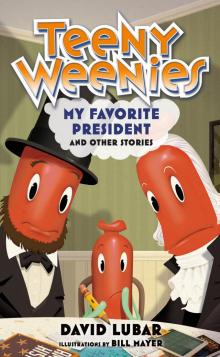 Teeny Weenies: My Favorite President
Teeny Weenies: My Favorite President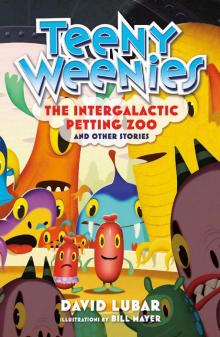 Teeny Weenies: The Intergalactic Petting Zoo
Teeny Weenies: The Intergalactic Petting Zoo Teeny Weenies: The Eighth Octopus
Teeny Weenies: The Eighth Octopus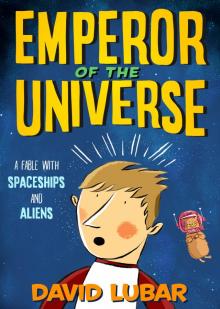 Emperor of the Universe
Emperor of the Universe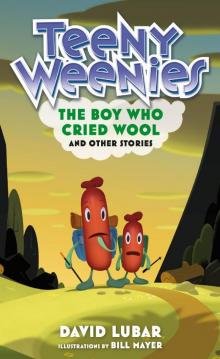 Teeny Weenies: The Boy Who Cried Wool
Teeny Weenies: The Boy Who Cried Wool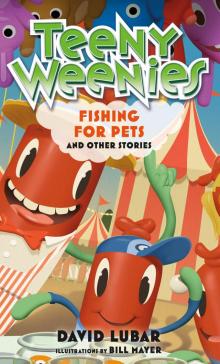 Teeny Weenies: Fishing for Pets
Teeny Weenies: Fishing for Pets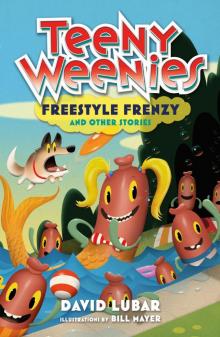 Teeny Weenies: Freestyle Frenzy
Teeny Weenies: Freestyle Frenzy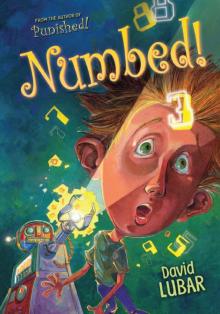 Numbed!
Numbed!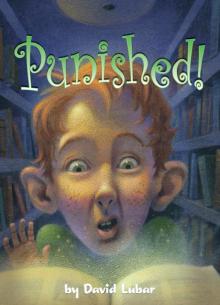 Punished!
Punished!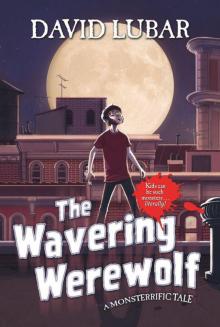 The Wavering Werewolf: A Monsterrific Tale (Monsterrific Tales)
The Wavering Werewolf: A Monsterrific Tale (Monsterrific Tales)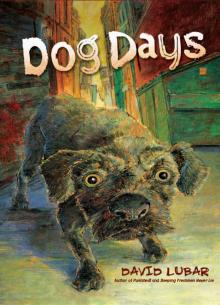 Dog Days
Dog Days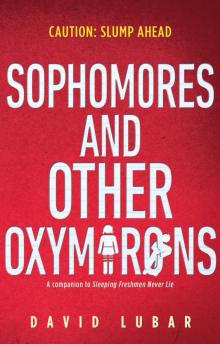 Sophomores and Other Oxymorons
Sophomores and Other Oxymorons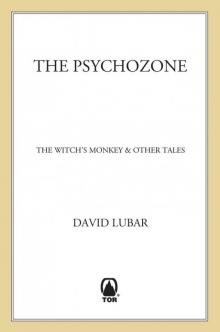 The Psychozone
The Psychozone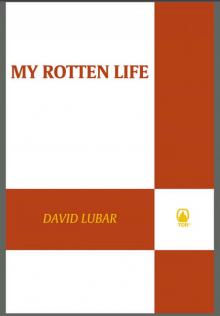 My Rotten Life
My Rotten Life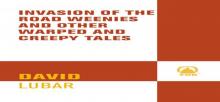 Invasion of the Road Weenies
Invasion of the Road Weenies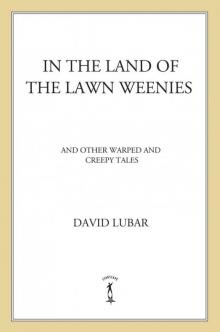 In the Land of the Lawn Weenies
In the Land of the Lawn Weenies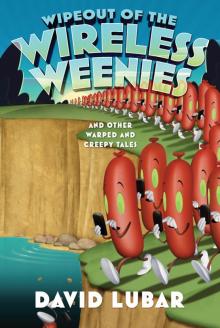 Wipeout of the Wireless Weenies
Wipeout of the Wireless Weenies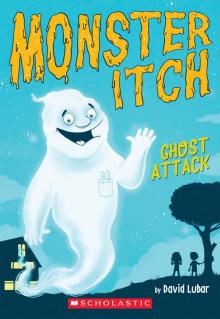 Ghost Attack
Ghost Attack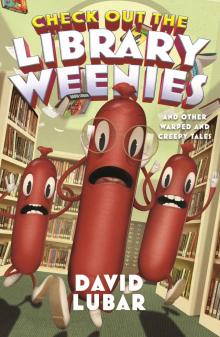 Check Out the Library Weenies
Check Out the Library Weenies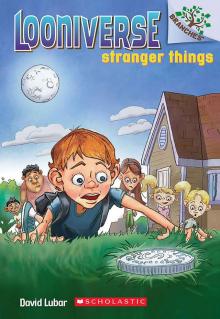 Looniverse #1: Stranger Things (A Branches Book)
Looniverse #1: Stranger Things (A Branches Book)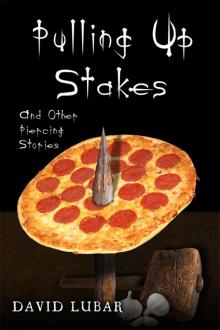 Pulling up Stakes and Other Piercing Stories
Pulling up Stakes and Other Piercing Stories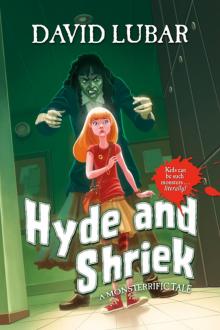 Hyde and Shriek
Hyde and Shriek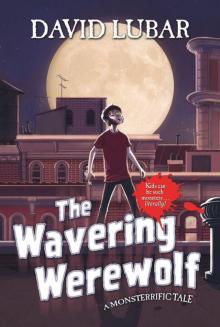 The Wavering Werewolf
The Wavering Werewolf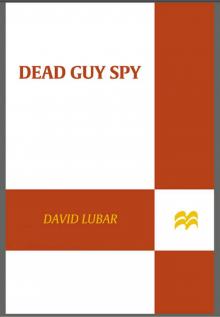 Dead Guy Spy
Dead Guy Spy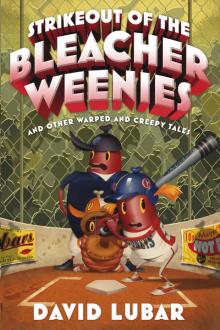 Strikeout of the Bleacher Weenies
Strikeout of the Bleacher Weenies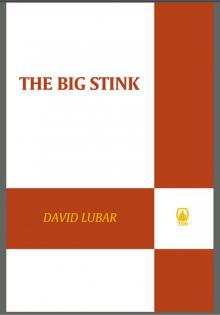 The Big Stink
The Big Stink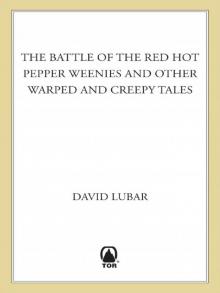 The Battle of the Red Hot Pepper Weenies
The Battle of the Red Hot Pepper Weenies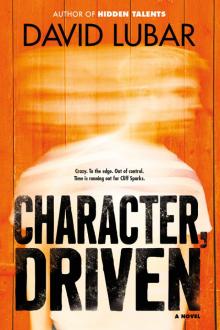 Character, Driven
Character, Driven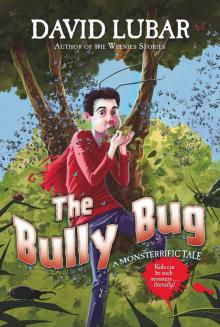 The Bully Bug
The Bully Bug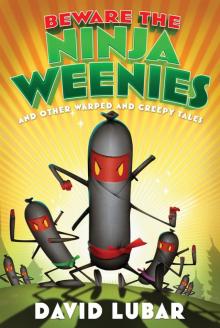 Beware the Ninja Weenies
Beware the Ninja Weenies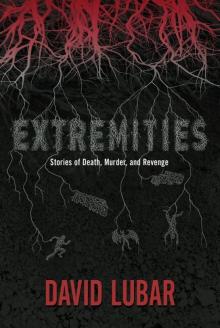 Extremities: Stories of Death, Murder, and Revenge
Extremities: Stories of Death, Murder, and Revenge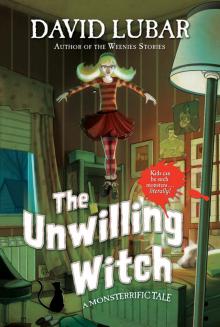 The Unwilling Witch
The Unwilling Witch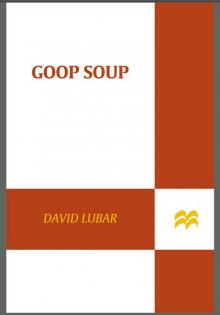 Goop Soup
Goop Soup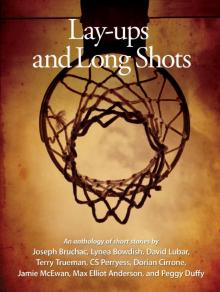 Lay-ups and Long Shots
Lay-ups and Long Shots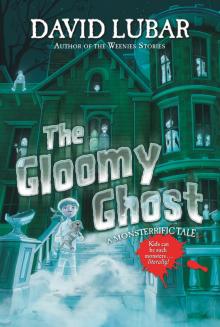 The Gloomy Ghost
The Gloomy Ghost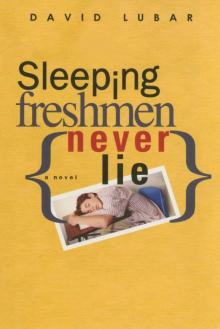 Sleeping Freshmen Never Lie
Sleeping Freshmen Never Lie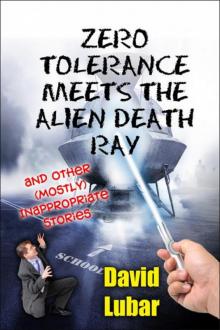 Zero Tolerance Meets the Alien Death Ray and Other (Mostly) Inappropriate Stories
Zero Tolerance Meets the Alien Death Ray and Other (Mostly) Inappropriate Stories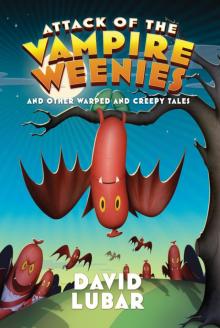 Attack of the Vampire Weenies
Attack of the Vampire Weenies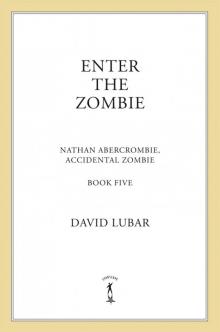 Enter the Zombie
Enter the Zombie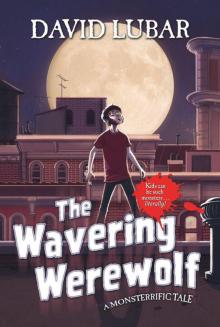 The Wavering Werewolf_A Monsterrific Tale
The Wavering Werewolf_A Monsterrific Tale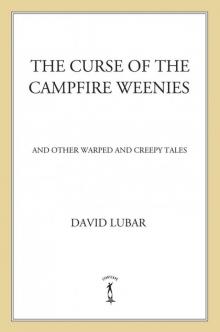 The Curse of the Campfire Weenies
The Curse of the Campfire Weenies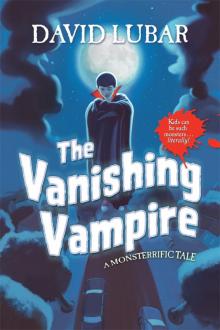 The Vanishing Vampire
The Vanishing Vampire